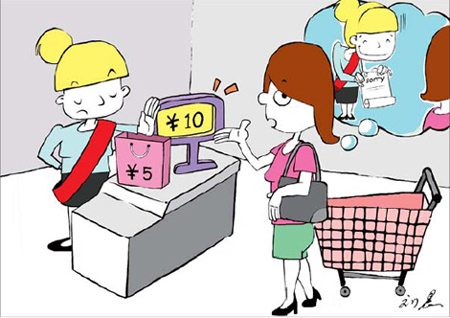
|
Metro> Comment
 |
|
Service drags down standards
By Liu Baijia (China Daily)
Updated: 2009-11-24 10:15 In many ways, Beijing has become an international city with excellent restaurants, luxury hotels and premium department stores. In terms of architecture and style, many facilities are just as good as any other city.
 Last weekend, I went to a store in the suburb of the city, which looks exactly the same or even better than those in Europe or the US. But the service was not to international standard. When I stepped into a jeans shop, a quarrel had erupted between four customers from Northeast China and the outlet's managers. The customers were charged twice due to ATM communication failure and demanded a refund. The refund did not take much time, but the customers had to wait for three hours to get an official apology.
A top Chinese mobile operator has a world-class call center and the operators are well-trained, polite and efficient. However, if you want to get your issues quickly addressed, you must call from a mobile phone. I once called the service center from a landline, but nobody answered the call. But when I dialed the number again from my mobile phone, the operator quickly picked up the phone and solved my question efficiently. As Beijing becomes more and more prominent in the world in its political and economic influences, infrastructures, historic and cultural heritages, the city should also know service can offer strong competitiveness and attraction too. Several years ago, I asked a CEO of a top Chinese online travel service provider: "What is your competitive edge against foreign companies like Expedia, which has invested in your Chinese competitor?" The man told me it was service. Some rules of the company's call center include: an operator must answer a customer's call within three rings, no more and no less; if customers dial their registered numbers, they must be addressed as Mr or Ms. The company is still the dominant player in the market, while its competitors are even further behind now. In a recent survey on the urban administration efficiency, Beijing ranked No 1 together with Shenzhen among more than 31 mainland provincial regions and 273 cities. One major category that makes Beijing stand out is its service sector, which accounts for 72 percent of the economy. There is no wonder Beijing outperforms other cities in the size of the service sector, where the most banks, airlines, telecom operators, best hotels and restaurants are located. However, the score of Beijing was just 0.68, while Hong Kong got 1.17. Beijing still has to improve its service quality significantly, if it wants to become a prominent international metropolis.
|
|||||||